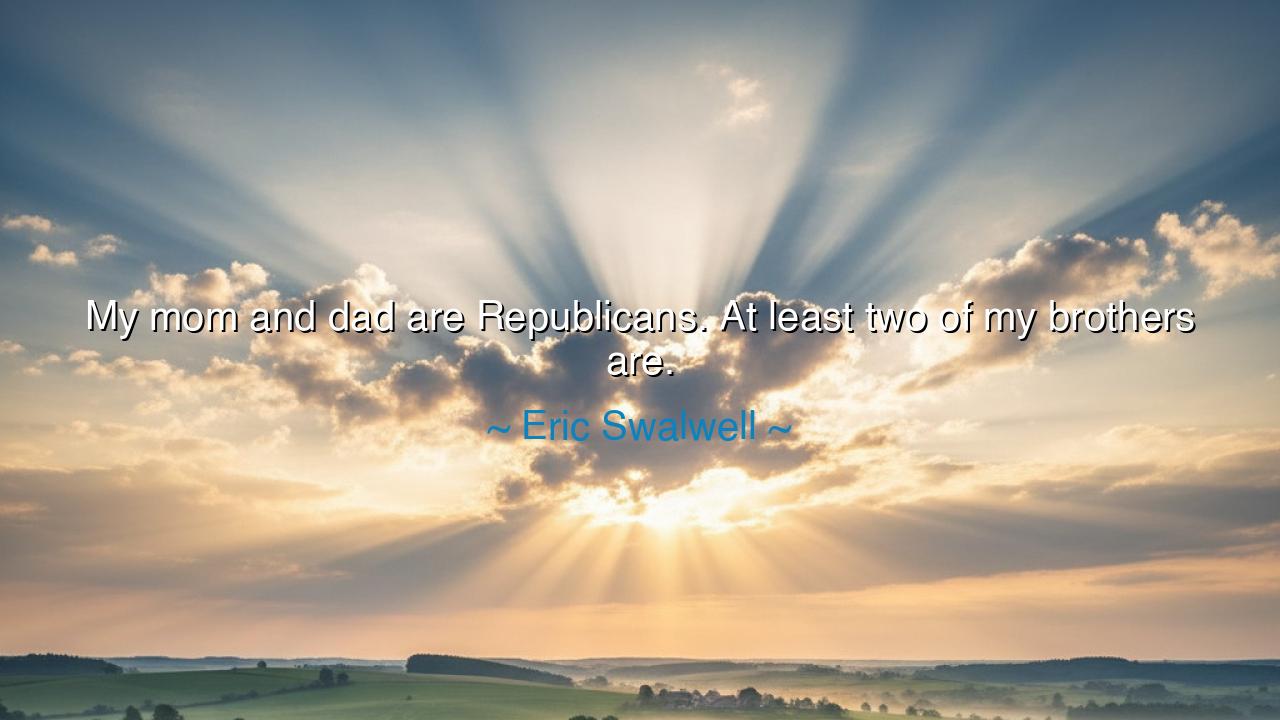
My mom and dad are Republicans. At least two of my brothers are.






"My mom and dad are Republicans. At least two of my brothers are." — Eric Swalwell
In these plain and humble words, Eric Swalwell offers not a political declaration, but a meditation on family, difference, and unity. Beneath the surface of this simple statement lies a truth that transcends party lines and centuries: that the bonds of kinship must endure even when the minds within a household do not think alike. When Swalwell says, “My mom and dad are Republicans. At least two of my brothers are,” he speaks with the tone of one who has learned to love across divisions. It is the voice of a man who has seen disagreement without discord, and who knows that strength lies not in sameness, but in the endurance of affection amid difference.
The origin of this quote lies not in grand rhetoric but in the quiet realities of American family life. Eric Swalwell, a Democratic congressman from California, has often spoken of his upbringing in a working-class home—one where politics were present, but love was paramount. In his words, we see not the bitterness of opposition, but the grace of understanding. He reminds us that even in a time when nations are split by ideology, a family can remain whole. Thus, his statement becomes a reflection of something deeply ancient: the eternal tension between belief and belonging, between the freedom of thought and the loyalty of blood.
Throughout history, great houses and empires have faced this same struggle. In the time of Ancient Rome, brothers fought on opposite sides of civil wars; fathers and sons served under rival banners. And yet, even amidst ruin, they often found themselves drawn back together—not by politics, but by the unbreakable chain of shared origin. Consider Marcus Aurelius, the philosopher-emperor. Though he ruled as Caesar, his writings in Meditations reveal a man constantly striving to love even those with whom he disagreed, reminding himself, “We were born for cooperation.” Swalwell’s words echo this wisdom: that unity does not demand uniformity, and that even across ideological lines, compassion can prevail.
To say, “My family are Republicans, and I am not,” is to acknowledge both separation and closeness. It is to live in the tension between conviction and compassion, between the duty to truth and the duty to love. The Republican parents and sons are not enemies—they are mirrors, reflecting back to him the shared roots from which they all grew. In the ancient way, this is the essence of balance: the harmony between difference and duty. The family becomes a microcosm of the world—a place where debate tests the strength of virtue, where patience tempers passion, and where understanding is greater than agreement.
Such balance is rare in the world today, where many would sooner sever ties than seek to understand. But wisdom teaches otherwise. A house divided by belief need not be a house destroyed. The truly noble spirit does not demand that all others walk his path; he walks his own while keeping his arms open. This is the courage of coexistence—the courage to love those who do not see as you see. In every generation, the wise have called this the highest form of leadership: not to conquer others with argument, but to honor them with empathy.
We may recall the story of Abraham Lincoln, who, in the midst of civil war, sought not only to preserve a nation but to heal it. “We are not enemies, but friends,” he said, calling Americans back to the higher calling of shared humanity. In the same way, Swalwell’s words—spoken without malice or mockery—remind us that our homes, our communities, and our nations can endure disagreement without hatred. To love one’s family despite political difference is to practice the very democracy one preaches: a system not of conformity, but of coexistence.
So, my child of tomorrow, take this lesson as you walk among the divided: seek understanding before judgment, and love before victory. Hold fast to your convictions, but hold closer to your compassion. When you meet those who differ from you, remember that they, too, are your kin in the grand family of humankind. Learn from them, as they learn from you. For as Eric Swalwell reminds us, even when the voices around the dinner table rise in debate, the deeper harmony of love must not be broken. In that harmony lies the strength of every enduring home—and of every enduring world.






AAdministratorAdministrator
Welcome, honored guests. Please leave a comment, we will respond soon